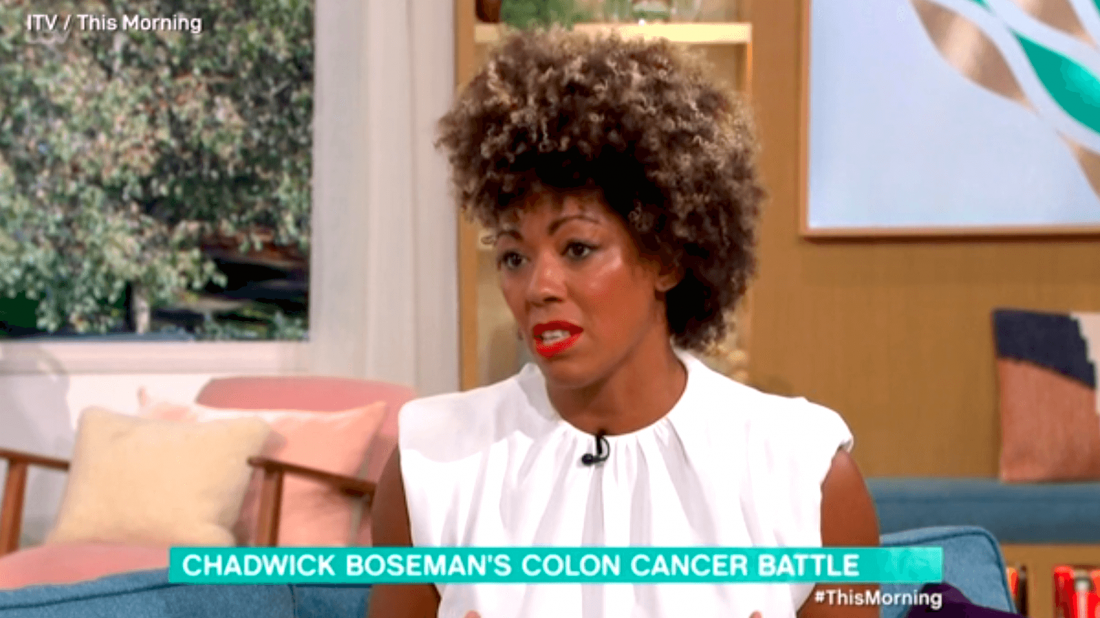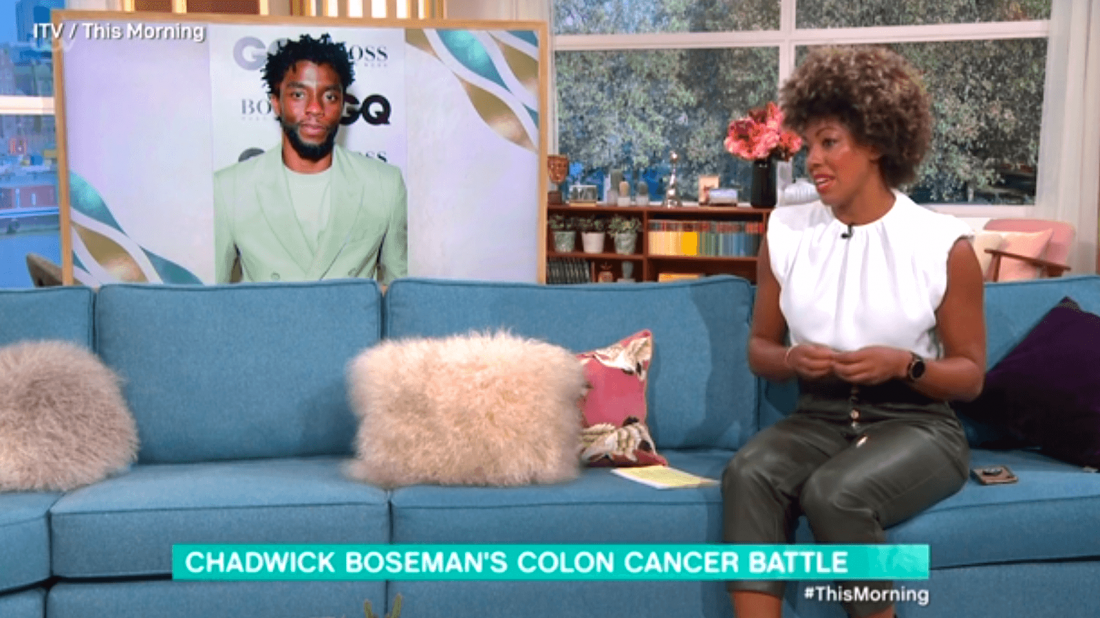Following the tragic death of 43-year-old Chadwick Boseman last week from colon cancer, Dr Zoe gives advice on the disease and the symptoms to look out for.

Image credit: ITV
Bowel cancer, as it is also known, is one of the most common cancers to be diagnosed in the UK, yet how many of us know what the signs and symptoms of the disease are?
The death of Hollywood actor Chadwick Boseman shocked the world as he had kept his four-year battle with colon cancer secret. The fact that colon cancer is generally regarded as a disease that affects older people made the news that the young and outwardly fit and healthy-looking Boseman had it, particularly hard to understand.
During a recent appearance on ITV’s This Morning show, Dr Zoe, who is our go-to TV doctor for her simple and incredibly helpful way of breaking down complex medical conditions, discussed how to spot the signs of colon cancer.
“If you have symptoms, speak to your GP. If you’re offered screening – do it, and don’t be afraid to talk about what’s going on with your body.”
Dr Zoe urged viewers: “If you have symptoms, speak to your GP. If you’re offered screening – do it, and don’t be afraid to talk about what’s going on with your body.”
“When it comes to symptoms of bowel cancer, the most important thing is that it’s detected early. When it’s detected early, it’s almost always curable.”
A particular challenge of colon cancer is that it isn’t always easily detectable. Dr Zoe: “It doesn’t always give people symptoms, but the symptoms that it can give are really anything that’s different.”
“So, when it comes to your bowel habit – your poo – it could be anything that’s different. It could be that you’re going more often than you’re used to, or you’re constipated.
“The consistency has changed; it’s either really hard or really soft. Obviously, if there’s blood in the poo, this is the one that people are aware of.”

Image credit: ITV
More than a good habit, it is crucial that we always check our stools after using the toilet.
During the programme, Dr Zoe also raised the fact that generally, people in the Black community shy away from discussing these illnesses and how even when we do, we are not given the right care, which have negative repercussions.
“There’s especially stigma in the Black community, people don’t talk about it and we need to change that.”
Dr Zoe said: “There’s especially stigma in the Black community, people don’t talk about it and we need to change that.”
“There’s stigma around being unwell, around being ill and how you might be treated differently. I think if we look at society and we look at the way people who are living with any long-term condition, whether that’s a cancer or otherwise, they are treated differently, they get less opportunities and they are discriminated against. So, I can understand. With Chadwick Boseman, I think it’s a fair guess to say that had he come forward and been honest about his diagnosis, he maybe wouldn’t have been cast in that incredible role [Black Panther].
Following her appearance on This Morning, Dr Zoe shared further advice about colon cancer via her Instagram page. Read on for a summary of the main points in the post below:
What is colon cancer?
Colon cancer begins in the large intestine (colon) and typically affects older adults, “but younger people can get it too”.
It can produce few, if any, symptoms in early stages, and for this reason, doctors recommend regular screening, for those over 60, to detect it early.
One in 20 of us will get it.
Is colon cancer the same as bowel cancer?
These two terms are often used inter-changeably and people mean cancer of the large bowel or rectum. It is sometimes known as colorectal cancer. It is also possible to get cancer of the small bowel/intestine, appendix or anus, but these are much less common.
What are the symptoms of colorectal cancer?
There are often no symptoms in the early stages of the disease. However, some people experience symptoms such as:
- A persistent change in your bowel habits, including diarrhoea or constipation
- A change in the consistency of your stool
- Rectal bleeding or blood in your stool
- Persistent abdominal discomfort, such as cramps, gas or pain
- A feeling that your bowel doesn’t empty completely
- Weakness or fatigue
- Unexplained weight loss
- A lump, or pain in the rectum or anus
- Although most people with colon cancer do not have symptoms of anaemia, they may lack iron as a result of bleeding from the cancer.
Who is susceptible?
- If you have one of the two rare inherited conditions that can lead to bowel cancer: familial adenomatous polyposis (FAP) or hereditary non-polyposis colorectal cancer (HNPCC), also known as Lynch syndrome.
- If you have inflammatory bowel disease (crohn’s or colitis)
- Older age – nine out of 10 cases are over 50s
- A family history of bowel cancer
- Unhealthy diet – especially if high in red and processed meat and low in fibre
- If you are physically inactive
- Excess body fat
- If you smoke or drink excessive amounts of alcohol.
Screening
If you’re 60 to 74, you’ll automatically be invited to do a home stool testing kit every two years
If you have any concerns about your health, don’t delay, make an appointment with your GP as soon as possible.












